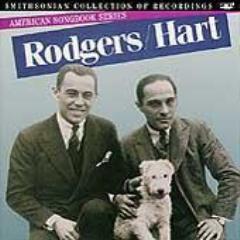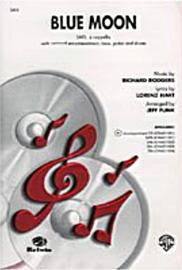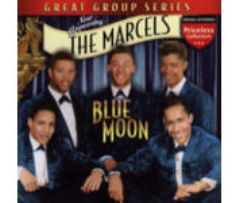Blue Moon
The moon theme is a gracious one. It’s not only poets, that associate it with nice feelings. I believe it is worth, therefore, to present yet another song with the Moon in its title.
Blue Moon.
The authors of this song are Richard Rodgers and Lorenz Hart who were, in late 1920s, the leading composers of musicals, which were written for the Broadway and London theatres, but this industry was also affected by the Big Crisis of 1929 – 1933. Rogers and Hart turned to Hollywood instead. In 1933 they signed a contract with Metro-Goldwyn-Meyer (MGM). Soon after they received a request to write music for the film Hollywood Party.
The film was intended to include many of the studio’s biggest stars. Rogers later wrote in his memoirs: 'One of our ideas was to include a scene in which Jean Harlow is shown as an innocent young girl saying - or rather singing - her prayers. How the sequence fitted into the movie I haven't the foggiest notion, but the purpose was to express Harlow's overwhelming ambition to become a movie star ('Oh Lord, if you're not busy up there,/I ask for help with a prayer/So please don't give me the air...').'
Jean Harlow
The song was never recorded and the scene from Harlow was never filmed. The song Prayer was registered for copyrights but never published.
The film Hollywood Party went on screens in 1934. Out of more than ten songs written by Rogers and Hart only three were featured. The cast included Jimmy Durante, Laurel and Hardy, The Three Stooges and Mickey Mouse. The sequence with Mickey Mouse were produced by Walt Disney in Technicolor. The film, however, did not turn out to be a financial success and was not well-received by critics.
Blue Moon
Hart wrote new lyrics to a melody, which was meant to be the main song for the film Manhattan Melodrama: 'Act One:/You gulp your coffee and run;/Into the subway you crowd./Don’t breathe, it isn’t allowed'. The leading characters were played by Clark Gable, William Powell and Myrna Loy. The director Van Dyke eventually decided no to use this song as the film’s (musical theme) but to adapt it for the night club scene. Hart wrote the third version of the lyrics: 'Oh, Lord …/I could be good to a lover,/But then I always discover/The bad in ev’ry man.' The title was The Bad In Every Man. It was sung by Shirley Ross, dressed and made-up to look like a black woman. The song was also published in the written form. However, it did not turn out to be a big hit.

Richard Rodgers and Lorenz Hart
Rogers still liked his composition, though. The boss of the publishing company MGM Jack Robbins suggested the song needed more popular and commercial character, with a romantic tone and ear-catching title. Lorenz Hart set to work for the fourth time. This time it was a hit. Robbins recommended the song, now titled Blue Moon, for a radio programme Hollywood Hotel. Soon after Blue Moon was the programme’s opening song. In January 1935 Columbia Records released the song performed by Connee Boswell. Then at last MGM also came around to appreciate it. Later it was featured in sever films, among them At the Circus and Viva Las Vegas.

Cover of Blue Moon Sheet Music Chord Chart edition
Instantly, new recordings followed. Their authors were, among others, Louis Armstrong, Frank Sinatra, Ella Fitzgerald, Billie Holiday, Dizzy Gillespie, Tony Bennett, Dean Martin, Julie London, Cowboy Junkies, The Supremes, Bobby Vinton and many more. Blue Moon still continues to be well-liked today. More than ten remakes have been recorded in 21st century alone.
Elvis Presley recorded a rock’n’roll version of the song. Quite unexpectedly, however, the most popular version turned out to be the one by The Marcels from 1961. The Marcels was a group of four musicians singing in the so-called doo-wop style. It is a form of Rhythm’n’Blues, which was very popular among African – Americans in the 1950s and early 1960s. The beginnings of doo-wop go date back to the 1930s, when the bands Ink Spots and Mills Brothers became very successful.
The name of The Marcels originated from the hairstyle of Fred Johnson’s sister Priscilla (Fred was the group’s bass singer). The then-popular hairstyle was called Marcel’s wave. Their version of Blue Moon was pretty shocking for some people. The bass syllables 'bomp-baba-bomp' and 'dip-da-dip' were something the white audience had not come across before.

The Marcels
Their version was No. 1 on the Billboard Hot 100 list for three weeks in April 1961. The following month it topped the charts in the United Kingdom. Today, listening to this tune, we may wonder why the interpretations of such masters as Armstrong, Holiday or Sinatra did not achieve such recognition, but, well, sometimes success is due to the time being right. It was for Marcels. The sales exceeded 1 million records and their remake found its way to the list of 500 Songs That Shaped Rock and the Rock and Roll Hall of Fame.
Blue Moon lyrics
Blue moon...Without a love of my own
Blue
moon
Is someone standing alone?
Without a dream in my heart
Without a love of my
own
Blue moon
You're just what I was there for
You heard me saying a prayer
for
Someone I really could care for
Without a love of my own Blue Without a love of my own Blue moon...Without a love of my own La luna...Esta en el cielo.. Without a love of my own
moon
Is someone standing alone?
Without a dream in my heart
Without a love of my
own
Con todas las estrellas..
Riendo muy remenante?
Blue moon
Without a love of my own
Last Updated (Monday, 16 March 2015 16:20)








